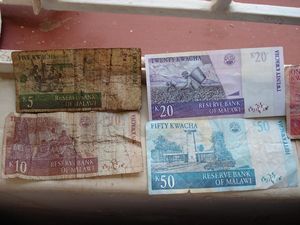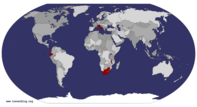Advertisement

 Malawian currency
Malawian currency
100 kwacha is about 71 cents (U.S.).
Mwezi marking Greg's laptop Thursday I spent another day meeting with Mike all day, since it would probably be our last office day before his departure (Friday is a camp day). In the afternoon we had a birthday party for the outgoing country director, who is moving on to work with refugees on the U.S.-Mexican border. One of the Malawian teachers at the camp, Isaiah, brought music he had composed, and the Malawian women on staff demonstrated some traditional Malawian dancing. Us
mzungu women ended up being pressured into trying it out, which was a disaster. As someone pointed out, you need to have African hardware (for lack of a better euphemism) to dance like that!
Every Thursday Matt hosts a movie night at our house which usually attracts 25-30 expats (he actually lugged a projector over here from the UK), so I got to meet a bunch of new people. Again, the range of foreigners here—and the range in terms of what they all do—is amazing, considering how many people back home didn’t know what or where Malawi was when I would tell them I was coming here.
Friday Mike and I went to the camp together, and we mostly walked

 Lilongwe river
Lilongwe river
The two markets are straddled on either side of the river. The clothes market is to the right of the river (not really visible in this photo), and the vegetable market is what you see in the distance.around the site of what will be the reception area for the incoming refugees from Luwani camp. Very little has been done to this point to accommodate the three thousand or so refugees from the south, who are due to arrive this week (though we are doubtful as to whether that schedule will be kept). Certainly no additional facilities have been constructed yet. We ate lunch at the market which was pretty cool. I got a 2-egg omelette with fries (yes, fries
in the omelette!) which cost about 70 cents; Mike got a couple of meat skewers, the first being some sort of liver, the second being goat steak, all costing around 90 cents.
Friday night I went to see Oliver Mtukadzi with some of the expats I have met. He is a Zimbabwean artist who is tremendously popular here, though the tickets (which cost about $14 each) were financially out of reach for the vast majority of Malawians. The audience consisted of a lot of expats, both Western and African, and well-to-do Malawians. It was an amazing concert though I think there were some power issues as a couple of times the speakers would go out. The band

 Entrance to the kaunjika market
Entrance to the kaunjika market
As you can see in the background the market is a dense maze of wooden stalls.went on performing acoustically which really got the crowd going. Everyone was dancing, which was a lot of fun and a great way to exercise 😊.
Saturday morning Isaiah, one of the Malawians who teaches at the camp, had kindly offered to escort me to the market to do my vegetable shopping (I was warned by many Malawians that it wouldn’t be safe for me to go alone). When I told him I had gone to the concert, he expressed awe that I had been willing to pay so much for a ticket. It made me feel pretty embarrassed, which is a feeling that has been growing over the course of my time here given how I am living. Matt and I have a staff at our house, which I don’t think I will ever be used to. I know it’s a good thing since it provides jobs for locals, but it’s still very strange. These feelings only grew when I visited Isaiah’s house on the way to the market. First of all, like most Malawians he lives way out of the central part of town, in an area that sees little to no mzungus. He is only 29,
but as the first born he supports eight dependents. He has a lovely wife and daughter, but he also supports several siblings and two orphaned girls from his village. (In Malawi it is pretty much universal practice for the eldest child to become responsible for supporting the entire family upon majority, including extended family like uncles and aunts. Don’t get any ideas Eva.) It is a struggle for Isaiah to be able to afford to send all of his dependents to school, which means they can’t all go everyday. Nonetheless they invited me to have a meal at their house next week, so I can finally sample some traditional Malawian food:
nsima and cassava leaves cooked in groundnut flour.
Isaiah and I then took a minibus to the market. There was a couple across from us shaking their heads at the headline story on the newspaper they were reading, which announced that 300 Malawians die every day from HIV/AIDS due to insufficient health care funds. It was about a 20-min. ride to the market (which is in the center of town). As we were walking down a main road—which was crammed with people doing their Saturday shopping—a man tried

 Lilongwe street
Lilongwe street
This is what most of the streets look like in the residential parts of town in the center (= well to do neighborhoods). Beautifully manicured gardens and huge overhanging trees.to steal from me by reaching into the side pocket of my bad; it was pretty pathetically obvious, I grabbed his arm and yanked it out and gave him a nasty look. Many people saw this and asked Isaiah what had happened; when he told them the guy had tried to pick pocket me they all shook their heads in disgust. Malawi used to be considered one of the safest places in Africa, and it’s still up there in terms of safety although it’s apparently getting more dangerous. Carjackings are not unheard of here, though I haven’t met anyone who knows anyone that has happened to. It seems that those who commit crimes are not tolerated by their communities so it’s not too rampant. But our house was broken into in November,
while Matt was in the house. So we now have a guard on the premises 24/7. (Of course, my parents' house in Houston was just broken into...people are the same everywhere.)
Anyway back to the market! It is a huge sprawl of wooden stalls on either side of the Lilongwe river. On the right side is the
kaunjika or second-hand clothes market (pretty much everyone except the wealthiest get their clothes here, other than the traditional
chitenje—traditional wrap—that most women wear). As you enter there are mostly kitchenwares, toiletries, and trinkets and sunglasses, as well as live chickens. As you get in deeper it is all second-hand clothes, which are laid out in huge heaps. You pay 20 kwacha (about 15 cents) to cross the river on a rickety little bridge to the vegetable market, where there is also prepared food like
nsima with chicken. I did see a couple of other expats at the market, though the vast majority of people shopping there were Malawians. It probably looks a lot like your typical African market, but for a first-timer it was fantastic and overwhelming; the paths between the stalls are super narrow, there are hordes of people all yelling something at you (especially if you’re a mzungu, in which case you hear “sister” or “miss” from every corner). Everywhere there are neat stacks of beautifully colored fruits and vegetables being sold by women. The vegetables are far cheaper than in the grocery stores, and haggling is pretty commonplace. Isaiah said he would tell me if something was a bad deal, but I think since I was with him people didn’t bother trying to rip me off too much. There are no scales, so you buy things by the bunch. I bought a ton of stuff—two huge heads of lettuce, about 15 big tomatoes, a bag of onions, six cucumbers, twelve carrots, six lemons, a bag of beans, and a few heads of garlic for about $6.
This morning I went back to the market on my own—though you have to be extremely vigilant of pickpockets it’s otherwise completely safe. I needed to buy some
kaunjika. I had been warned it would be cold here so I didn’t pack any shortsleeved shirts but it’s actually around 80 degrees during the day—and always sunny, which means it can get hot if you have to do a lot of walking with your laptop on your back! It cools down considerably at night though, and it’s at least ten degrees colder (and windy) at the camp. I got four button-down cotton workshirts for about $6, and three t-shirts for $4 (all after bargaining). I assumed that I must have been ripped off since I didn't have Isaiah with me, but Ruth, a Malawian woman who works in our office, said that was a fair price - I was very proud of myself!
I think that about covers my first week here. I am still getting used to how things work but I have almost mastered the minibus system (which is no easy task since they don’t have bus numbers or anything and even if they say they’re going where you want to go they might race all over town before getting there), I can get around the market myself, and I don’t feel so isolated from Malawian life anymore, which was really getting me down earlier in the week. I dosometimes feel awkward about the fact that I am here to work with refugees, in one of the poorest countries in the world (last I heard it was fourth on that list). Most Malawians live in desperate conditions, and need help as much as refugees do, and I am sure they wonder why we are in their country helping foreigners. But you have to pick your battles and I suppose the refugees here need as much help as possible precisely because they are in such a poor country. (Though it’s not like the refugees in the U.S. are that much better off; they’re locked in detention centers like criminals while they wait for their refugee status determination.) It’s hard not to have feelings of guilt due to the inequalities I see every day; the most important thing I think I can do right now is avoid running away from reality. It would be entirely possible to encircle myself with expats only and rarely encounter a Malawian in any personal context, but I am doing my best not to let that happen.
Alright, off to make some good use of all those veggies I bought…
Love
Martina
Advertisement
Tot: 0.211s; Tpl: 0.011s; cc: 15; qc: 68; dbt: 0.1213s; 1; m:domysql w:travelblog (10.17.0.13); sld: 1;
; mem: 1.2mb











zettie
non-member comment
awesome work!
hi martina, love reading your blog daily,it is fascinating, so glad i can share your experience, please keep it up,getting a whole new perspective on life!travel safe,zettie,s a